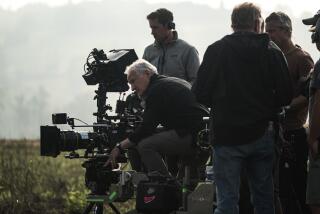Ted Mann; Theater Chain Owner Put His Name on Grauman’s Chinese
Ted Mann, former sole owner and chairman of the Mann Theatres chain, which includes the landmark Chinese Theatre in Hollywood, and a lifelong philanthropist who aided disadvantaged children and women, died Tuesday in his Los Angeles home. He was 84.
Mann, a savvy businessman who also produced innovative low-budget films, markedly increased his profile in 1973 when he put his name on Grauman’s Chinese Theatre founded by impresario Sid Grauman in 1927. The name change occurred when Mann bought the foundering National General Theatre chain, whose 276 screens included the Chinese, for $67.5 million.
Substituting “Mann’s” for “Grauman’s” was highly controversial a quarter of a century ago with Hollywood traditionalists and tourists who flocked from around the world to examine stars’ hand- and footprints embedded in the concrete of the exotic building’s forecourt.
The late Times columnist Jack Smith was still miffed when he wrote in 1987: “It has always seemed a sacrilege to me that Ted Mann should have erased Sid Grauman’s name and substituted Mann’s as the name of the theater, though that of course was his privilege. I wonder whether, if he were to buy the Eiffel Tower, he would change its name to Mann’s Tower.”
Former Times arts editor Charles Champlin was more understanding, although he did note in print that “Mann undercalculated the ferocity of the movie buff’s attachment to the past. Some of the outcriers may not have been inside the Chinese since Sid Grauman opened it; still the indignation jarred the footprints in the forecourt.”
Within two years of the historic relabeling, Champlin noted approvingly, “History and accuracy have reached a kind of compromise. Popular usage is increasingly just ‘the Chinese’ and the logo includes a fairly quiet and impersonal ‘Mann Theaters.’ ”
Mann, the pragmatic businessman, occasionally made other unpopular decisions. When the single-screen Loma Theatre in San Diego, owned by Mann Theatres, was threatened with demolition in 1987, Mann was told that film buffs and preservationists objected. “Then they should have bought more tickets!” he retorted.
Within the motion picture industry, Mann was considered a shrewd visionary who in tough times not only helped save the theater business but also made it flourish, building multiscreen complexes and finding material that would attract increasingly young audiences.
“All our samplings show an audience that ranges from 15 to 35. And they want to go out; they want to get out of the house,” he told The Times in 1975. “And they’ll leave television if you’ll only give them something they want to see.”
By then he was doing that. Mann, who had wanted to be in the movie business since he was a theater usher in Minnesota, moved to Los Angeles in 1970 to become a producer.
In quick order, he turned out Ray Bradbury’s “The Illustrated Man,” “Lifeguard” with the then barely known Sam Elliott and “Buster and Billie” with another newcomer, Jan-Michael Vincent.
Later he would help produce Robert Redford’s “Brubaker” and the dungeons-and-dragons fantasy “Krull,” whose cast included Liam Neeson.
Born in Wisheck, N.D., to immigrant homesteader parents, Mann moved as a child to Minnesota, and worked his way through the University of Minnesota. He got his start when he leased St. Paul’s financially troubled Selby Theater for $100 a month and ran it as a one-man operation--renting the films, selling tickets, running the projector and chatting with customers.
He acquired more than 25 other theaters and drive-ins, establishing one of the largest independent chains in the upper Midwest. Mann sold his group to General Cinema Corp. in 1970 and headed west.
Lured from production back to theaters three years later, he built Mann Theatres from its original 276 screens to 360 by 1986, when he sold his company to Gulf & Western for $220 million. Mann stayed on as chairman, retiring in 1991 when Mann Theatres boasted about 500 screens.
In Minneapolis and Los Angeles, Mann was known for his philanthropy. He was a founder and president of the Boys’ Club of Minneapolis and a founder of the Landmark West School for Dyslexic Children in Los Angeles. He was a longtime board member of Mount Olivet Rolling Acres Home for Retarded Children and a contributor to Childhelp, USA, and World Opportunities International.
With his wife, actress Rhonda Fleming, whom he married in 1977, Mann established the Rhonda Fleming Mann Resource Center for Women With Cancer at UCLA. Mann said he started the center “so that no woman would have to face cancer alone.”
In 1984, he created the Ted Mann Foundation, which has contributed to such organizations as the Salvation Army, Boys & Girls Clubs, United Way, Wilshire Boulevard Temple, the United Jewish Fund, Operation Exodus and the Jerusalem Foundation.
In 1997, Mann and his wife received the Lifetime Achievement Award from the UCLA Jonsson Cancer Center Foundation.
Mann is survived by Fleming; two daughters, Victoria Mann Simms and Roberta Mann Benson; a sister, Edythe; two grandsons; and two granddaughters.
A memorial service is scheduled for today at 2 p.m. at Hillside Mortuary.
The family has asked that memorial contributions be sent to UCLA’s Rhonda Fleming Mann Resource Center for Women with Cancer, or to the Boys & Girls Club of Minneapolis.
More to Read
The biggest entertainment stories
Get our big stories about Hollywood, film, television, music, arts, culture and more right in your inbox as soon as they publish.
You may occasionally receive promotional content from the Los Angeles Times.










